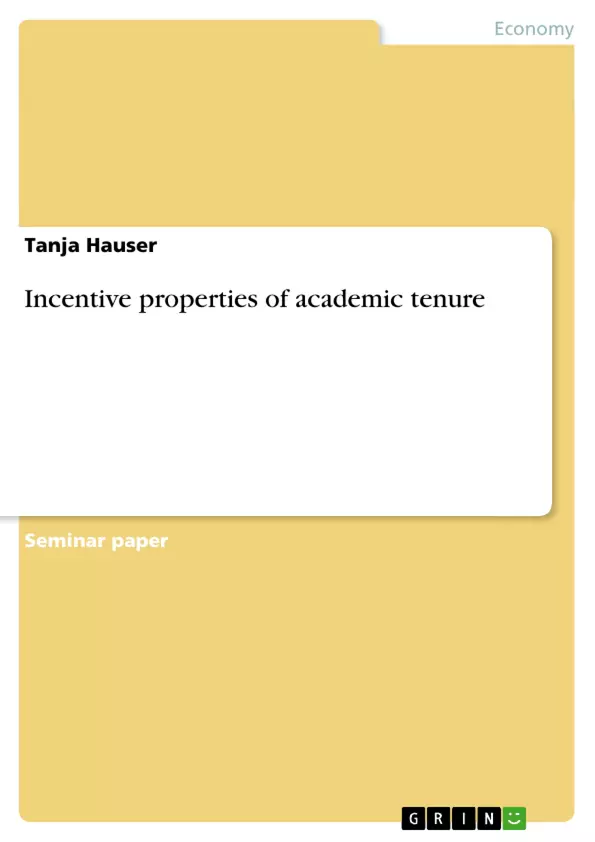When a person is employed in a particular position, it is expected that he will work hard and perform well, regardless of his status. In the sector of Academia there are several incentives to work hard, such as promotion to full professorship and increases in the salary. Furthermore, there is also the opportunity to attain tenure, which would guarantee employment for life. As such, tenure provides possibly the strongest incentive to pursue good work.
This type of job security, however, is often criticized, as a decline of effort and productivity are expected after tenure is awarded.
This paper will investigate whether there are incentives for academics to continue to work hard, and not to slack off after tenure is granted. It will commence by explaining, the academic tenure system, in chapter 2 to understand the whole purpose of the idea of tenure, followed by an analysis of two models, in chapter 3 and 4, which will explore the role of tenure as incentive to exert effort in consideration of job security.
The first model, analysed in section 3, is a theoretically solved principal -agent problem by A. Dnes and N. Garoupa. It analyses how the participants will act and how incentives should be set so that efficient work will result. The second model, by S. Li and H. Ou-Yang, analysed in chapter 4 investigates empirical data to determine if academics work hard even if after tenure has been obtained.
Finally to end this paper the main results will be summarised and relevant conclusions will be drawn.
Inhaltsverzeichnis (Table of Contents)
- Introduction
- The academic tenure system
- Reasons for tenure
- The process of granting tenure
- Revocation of tenure
- Model of academic tenure and contractual damages
- Basic model
- Stage 3: Department decision
- Stage 2: Incentive compatibility constraint
- Stage 1: Participation constraint
- Cognitions
- Basic model
- Empirical model of incentive, performance and academic tenure
- The analysis and data set
- Findings of the study
- Acquired implications of tenure
- Result of the analysis
- Conclusions
Zielsetzung und Themenschwerpunkte (Objectives and Key Themes)
This paper aims to investigate whether there are incentives for academics to continue working hard, even after tenure is granted. It analyzes the academic tenure system and explores the role of tenure as an incentive to exert effort in consideration of job security.
- The purpose and benefits of the academic tenure system
- The impact of tenure on academic performance and productivity
- The role of tenure as an incentive to exert effort
- The potential drawbacks of tenure
- The comparison of tenure systems in different countries
Zusammenfassung der Kapitel (Chapter Summaries)
- Introduction: This chapter introduces the topic of academic tenure and its importance as an incentive for academic performance. It discusses the potential for decline in effort and productivity after tenure is awarded.
- The academic tenure system: This chapter provides a comprehensive overview of the academic tenure system, including its history, rationale, and current implementation. It also examines the process of granting and revoking tenure.
- Model of academic tenure and contractual damages: This chapter presents a theoretical model that analyzes the relationship between tenure, effort, and productivity. It explores how incentives should be structured to encourage efficient work.
- Empirical model of incentive, performance and academic tenure: This chapter investigates empirical data to determine whether academics maintain high levels of effort after obtaining tenure. It analyzes the relationship between incentive, performance, and tenure using real-world data.
Schlüsselwörter (Keywords)
This paper examines the concept of academic tenure and its impact on academic performance. Key themes include the incentives provided by tenure, the potential for decline in effort after tenure is granted, and the comparison of tenure systems across different countries. The study focuses on the theoretical and empirical analysis of the relationship between tenure, effort, and productivity, as well as the implications of tenure for academic freedom and institutional efficiency.
Frequently Asked Questions
What is the purpose of the academic tenure system?
The primary purpose of tenure is to guarantee employment for life, which is intended to protect academic freedom and provide a strong incentive for high-quality research and teaching.
Does productivity decline after an academic is granted tenure?
This is a common criticism. The paper investigates whether the lack of job insecurity leads to "slacking off" or if other incentives like reputation and salary increases maintain productivity.
What does the principal-agent model say about tenure?
The model by Dnes and Garoupa analyzes how universities (principals) can set incentives for professors (agents) to ensure efficient work despite the high job security that tenure provides.
Can academic tenure be revoked?
While tenure provides life-long employment, it can be revoked under extreme circumstances, such as professional misconduct or the elimination of a whole department, though this is rare.
Are there empirical findings on work effort post-tenure?
The study by Li and Ou-Yang analyzed in the paper uses empirical data to show that many academics continue to work hard even after obtaining tenure, driven by internal and external professional factors.
- Citation du texte
- Tanja Hauser (Auteur), 2006, Incentive properties of academic tenure, Munich, GRIN Verlag, https://www.grin.com/document/76283



